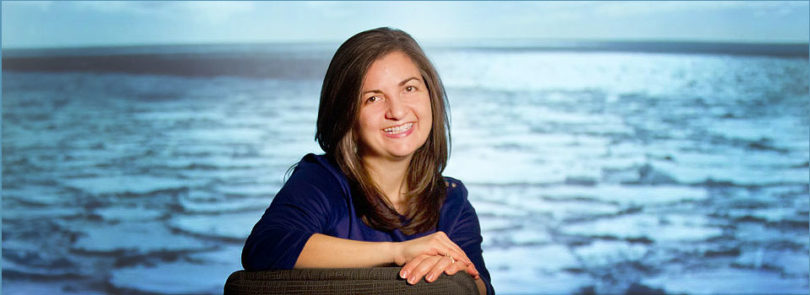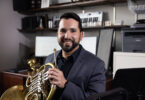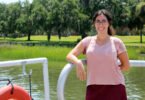Associate professor of marine sciences Patricia Yager has journeyed to the Antarctic, the Amazon River plume and the Arctic in search of a better understanding of how climate is impacting these biological hot spots. Thousands of K-12 school students across the nation follow along vicariously through blogs written about her work.
Where did you earn degrees and what are your current responsibilities at UGA?
I earned my B.S. in geology from Brown University and my M.S. and Ph.D. from the University of Washington’s School of Oceanography. I am an associate professor in the department of marine sciences at UGA. I am also the director of the university’s Climate and Society Initiative (http://climateandsociety.ovpr.uga.edu), a group of faculty and professional staff on campus who have a well-defined mission to “foster a scientific community” that, among other things, integrates research, outreach and instructional efforts to engage the community.
When did you come to UGA and what brought you here?
I came to UGA in 1998 to join the growing marine sciences department here. My spouse, Dr. Steven Holland, has been a faculty member here in the geology department since 1991.
What are your favorite courses and why?
I really enjoy teaching the Honors-level biology class (MARS 1025H) to non-science majors. Everyone seems to love marine biology even if they don’t love science. I try to teach the class so that marine science is approachable to all students. Every once in a while, someone in the class even decides to change majors!
I also enjoy teaching a graduate course (MARS 8050) on “Climate, the Ocean, and the Marine Biosphere.” It evolves every time I teach it and keeps me current on the latest research findings across the broad fields related to climate. I also expect that every current graduate student in marine science will find themselves dealing with climate change issues in the future—no matter what their research focus—so I hope to give them some tools to do that.
What interests you about your field?
Oceanography as a field is fairly young, very dynamic and highly interdisciplinary, so it satisfies my curiosity to understand how the planet works. You have to be able to connect the dots between many different fields. The ocean plays a key role in the Earth’s climate system. The role of the microorganisms in the ocean is also recognized to have a major impact on global climate.
What are some highlights of your career at UGA?
In 2009, I became the lead scientist on four major grant proposals to study climate change impacts on the marine biosphere. It was a busy year just submitting them all, then all four were funded! I have spent the past three years working harder than I have ever worked in my life, including being chief scientist on four large ocean research expeditions. These trips have taken me to the Antarctic, the Amazon River plume and the Arctic—a total of over six months in the field since. I think I have a pretty good sense now of how climate is impacting these biological “hot spots” in the ocean. I’m spending this year working up the data, synthesizing our findings and writing papers. I expect it will take us many years to figure everything out—we have so much incredible data.
How does your research or scholarship inspire your teaching, and vice versa?
The oceans are changing rapidly, and these changes will no doubt impact our human world. My research inspires me to inform the students about these changes and to help teach them about ways to mitigate such effects.
Describe your ideal student.
Someone who is passionate about learning and works hard to find the answers he or she seeks.
Favorite place to be/thing to do on campus is…
The Trial Garden behind the marine sciences building is a lovely place to sit and think. I also taught my boys to read there (recognizing the colors written on the flower labels) every morning on our way to the Child Development Lab at the McPhaul Center. I’m also a regular at the coffee bar at the UGA Hotel and Conference Center!
Beyond the UGA campus, I like to…
Go hiking with my family. I also love to go to sea! I read a lot.
Community/civic involvement includes….
An example of one of the things that the Climate and Society Initiative does with the community includes serving as an information resource when individuals or groups have questions about climate-related issues. We have several education programs in development that will be implemented in the next six months. We also are supporting the Climate Task Force on campus with the UGA Office of Sustainability to accomplish the stewardship and sustainability goals laid out in UGA’s Strategic Plan for 2020.
In addition, I work closely with educators to improve the K-12 science curriculum. While I have worked with Athens elementary and high school classrooms, my main partner is Delores (Lollie) Garay, who teaches middle-school science in Houston, Texas. She has traveled with me to the Antarctic, the Amazon and the Arctic. Her original support came through the PolarTrec program for teachers and researchers working together in the polar regions. Her collaboration with me in the tropics was funded by the NSF-RET (Research Experiences for Teachers) program with funds through NSF-Ocean Sciences. Lollie has helped me with the three project websites, specifically by blogging during our expeditions. Our Antarctic site (http://AntarcticASPIRE.org) had over 16,000 hits during the ASPIRE expedition in 2010-11. The Amazon site (http://AmazonContinuum.org) and the Arctic site (http://ArcticNitro.org) have also been pretty popular with K-12 students around the country. I also worked with Jeff Peneston, a middle-school science teacher who was New York State Teacher of the Year in 2011. He was part of my team for an Antarctic project in 2008-09 (http://www.polartrec.com/member/jeff-peneston).
Favorite book/movie?
I’m a hopeless romantic, but I also admire independent women. My favorite movie is “Out of Africa.” My favorite books are “True North” by Jill Kerr Conway and “Artic Dreams” by Barry Lopez.







